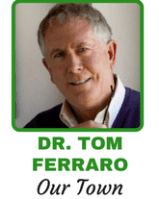
If you had any doubts about whether American nationalism still exists, all you had to do was to tune into the Presidents Cup down at Quail Hollow Club in Charlotte, N.C. The Presidents Cup brings the best 12 golfers from the United States to play biennially in a four-day event against the best 12 players internationally minus Europe.
For sports fans, this kind of international event is riveting because it is based upon national spirit, national identity and national pride. Shouts of “USA” were chanted when rising American stars like Max Homa, Sam Burns or Patrick Cantlay made putts.
So let us take a moment to deconstruct the nature of this nationalism, a mysterious term that we are educated to embrace from the first day of kindergarten when we are asked to stand up and pledge our allegiance to the flag.
I guess the first time I recognized that a big part of my identity was American was when I was 17 and got to shake Bobby Kennedy’s hand during his New York Senate campaign. I remember the moment. I stood up real tall as he drove around a shopping mall parking lot in Massapequa and as I reached up, he reached down from the car and shook my hand. The buttons on his shirt sleeve were all ripped off by the crowd grabbing at him.
He was boyish, good looking, very Ivy League, with his hair tussled back and a nice smile. A big guy was behind him holding him so that he wouldn’t be pulled out of the car. Pure charisma. It was about 10 months after his brother had been shot, but I think America still had hope then.
That memory of mine of this little handshake is what we call a “screen memory” in psychoanalysis. A screen memory is distant but distinct and which represents much more than it seems. We all have these memories that remain in our minds like a beacon from the past. This was my very first political memory and represents for me what it meant to be American.
The Kennedys were adored by the world. The assassination of John F. Kennedy occurred more than 59 years ago, and Bobby Kennedy was assassinated 54 years ago. I think the nation is still grieving from those losses. The two deaths shattered the American identity to such an extent that ever since then we have been within a repetition compulsion, systematically eviscerating every president who has dared to follow in their footsteps.
We shield ourselves from new attachments to prevent any of them from entering our hearts and souls. Instead, we get rid of them fast. Nixon was destroyed, Ford was voted out, Carter was out in one term, Bush I was out after one term, Reagan was shot, Clinton was impeached and so was Trump. A nation that can’t heal is a nation that repeats its past. And the question is exactly how does one heal from loss, especially big losses like the killing of a beloved president?
I think this is why we see such passion, longing and cheering at these international sporting events like the Olympics or golf’s Presidents Cup. This is America turning its lonely eyes to our American heroes, the athletes. I think it is a way of trying to heal or patch up the shattered American identity. Freud once said that it is impossible to heal from loss but instead one must find replacements for lost objects. Though Freud never took any interest in the world of sports, I think it is accurate to say that the way a nation heals from deep losses is to turn to our favorite American heroes, our sports stars. You may recall how the nation rallied around baseball after 9/11. This is sports providing a way for the fan to heal the shattered soul.
So, this year we can thank Jordan Spieth, Justin Thomas, Sam Burns and Tony Finau for ministering to our national wounds and re-establishing our identity and our pride. In the years past we had Patrick “Captain America” Reed or Tiger Woods do the same thing at the Ryder Cup. This is the glory of sports, the wonder of our superstar athletes and even the mysterious way that a nation heals from its deepest losses of the past.







